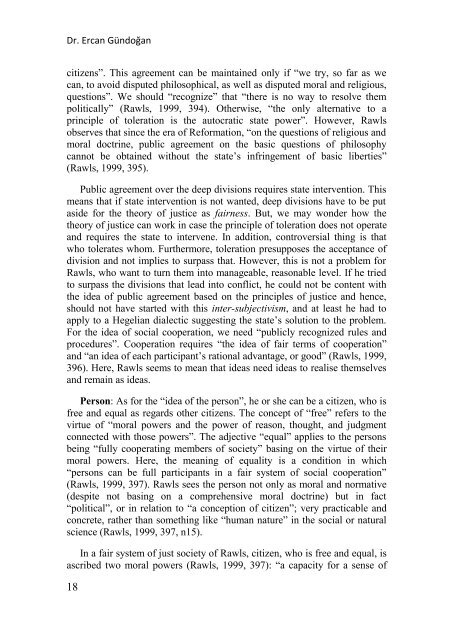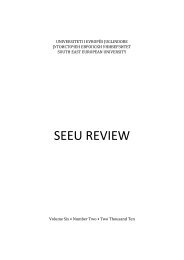SEEU Review vol. 5 Nr. 2 (pdf) - South East European University
SEEU Review vol. 5 Nr. 2 (pdf) - South East European University
SEEU Review vol. 5 Nr. 2 (pdf) - South East European University
You also want an ePaper? Increase the reach of your titles
YUMPU automatically turns print PDFs into web optimized ePapers that Google loves.
Dr. Ercan Gündoğan<br />
citizens”. This agreement can be maintained only if “we try, so far as we<br />
can, to avoid disputed philosophical, as well as disputed moral and religious,<br />
questions”. We should “recognize” that “there is no way to resolve them<br />
politically” (Rawls, 1999, 394). Otherwise, “the only alternative to a<br />
principle of toleration is the autocratic state power”. However, Rawls<br />
observes that since the era of Reformation, “on the questions of religious and<br />
moral doctrine, public agreement on the basic questions of philosophy<br />
cannot be obtained without the state’s infringement of basic liberties”<br />
(Rawls, 1999, 395).<br />
Public agreement over the deep divisions requires state intervention. This<br />
means that if state intervention is not wanted, deep divisions have to be put<br />
aside for the theory of justice as fairness. But, we may wonder how the<br />
theory of justice can work in case the principle of toleration does not operate<br />
and requires the state to intervene. In addition, controversial thing is that<br />
who tolerates whom. Furthermore, toleration presupposes the acceptance of<br />
division and not implies to surpass that. However, this is not a problem for<br />
Rawls, who want to turn them into manageable, reasonable level. If he tried<br />
to surpass the divisions that lead into conflict, he could not be content with<br />
the idea of public agreement based on the principles of justice and hence,<br />
should not have started with this inter-subjectivism, and at least he had to<br />
apply to a Hegelian dialectic suggesting the state’s solution to the problem.<br />
For the idea of social cooperation, we need “publicly recognized rules and<br />
procedures”. Cooperation requires “the idea of fair terms of cooperation”<br />
and “an idea of each participant’s rational advantage, or good” (Rawls, 1999,<br />
396). Here, Rawls seems to mean that ideas need ideas to realise themselves<br />
and remain as ideas.<br />
Person: As for the “idea of the person”, he or she can be a citizen, who is<br />
free and equal as regards other citizens. The concept of “free” refers to the<br />
virtue of “moral powers and the power of reason, thought, and judgment<br />
connected with those powers”. The adjective “equal” applies to the persons<br />
being “fully cooperating members of society” basing on the virtue of their<br />
moral powers. Here, the meaning of equality is a condition in which<br />
“persons can be full participants in a fair system of social cooperation”<br />
(Rawls, 1999, 397). Rawls sees the person not only as moral and normative<br />
(despite not basing on a comprehensive moral doctrine) but in fact<br />
“political”, or in relation to “a conception of citizen”; very practicable and<br />
concrete, rather than something like “human nature” in the social or natural<br />
science (Rawls, 1999, 397, n15).<br />
In a fair system of just society of Rawls, citizen, who is free and equal, is<br />
ascribed two moral powers (Rawls, 1999, 397): “a capacity for a sense of<br />
18

















